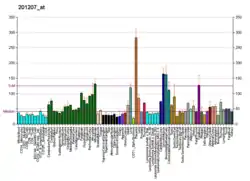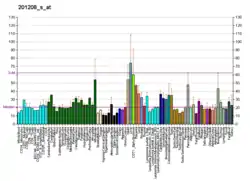TNFAIP1
BTB/POZ domain-containing protein TNFAIP1 is a protein that in humans is encoded by the TNFAIP1 gene.[5][6][7]
This gene was identified as a gene whose expression can be induced by the tumor necrosis factor alpha (TNF) in umbilical vein endothelial cells. Studies of a similar gene in mouse suggest that the expression of this gene is developmentally regulated in a tissue-specific manner.[7]
References
- GRCh38: Ensembl release 89: ENSG00000109079 - Ensembl, May 2017
- GRCm38: Ensembl release 89: ENSMUSG00000017615 - Ensembl, May 2017
- "Human PubMed Reference:". National Center for Biotechnology Information, U.S. National Library of Medicine.
- "Mouse PubMed Reference:". National Center for Biotechnology Information, U.S. National Library of Medicine.
- Dixit VM, Green S, Sarma V, Holzman LB, Wolf FW, O'Rourke K, Ward PA, Prochownik EV, Marks RM (Mar 1990). "Tumor necrosis factor-alpha induction of novel gene products in human endothelial cells including a macrophage-specific chemotaxin". J Biol Chem. 265 (5): 2973–8. PMID 2406243.
- Holzman LB, Marks RM, Dixit VM (Dec 1990). "A novel immediate-early response gene of endothelium is induced by cytokines and encodes a secreted protein". Mol Cell Biol. 10 (11): 5830–8. doi:10.1128/MCB.10.11.5830. PMC 361366. PMID 2233719.
- "Entrez Gene: TNFAIP1 tumor necrosis factor, alpha-induced protein 1 (endothelial)".
Further reading
- Wolf FW, Marks RM, Sarma V, et al. (1992). "Characterization of a novel tumor necrosis factor-alpha-induced endothelial primary response gene". J. Biol. Chem. 267 (2): 1317–26. PMID 1370465.
- Pandey A, Shao H, Marks RM, et al. (1995). "Role of B61, the ligand for the Eck receptor tyrosine kinase, in TNF-alpha-induced angiogenesis". Science. 268 (5210): 567–9. doi:10.1126/science.7536959. PMID 7536959.
- Suzuki H, Fukunishi Y, Kagawa I, et al. (2001). "Protein-protein interaction panel using mouse full-length cDNAs". Genome Res. 11 (10): 1758–65. doi:10.1101/gr.180101. PMC 311163. PMID 11591653.
- Strausberg RL, Feingold EA, Grouse LH, et al. (2003). "Generation and initial analysis of more than 15,000 full-length human and mouse cDNA sequences". Proc. Natl. Acad. Sci. U.S.A. 99 (26): 16899–903. doi:10.1073/pnas.242603899. PMC 139241. PMID 12477932.
- Link CD, Taft A, Kapulkin V, et al. (2003). "Gene expression analysis in a transgenic Caenorhabditis elegans Alzheimer's disease model". Neurobiol. Aging. 24 (3): 397–413. doi:10.1016/S0197-4580(02)00224-5. PMID 12600716. S2CID 22679483.
- Gerhard DS, Wagner L, Feingold EA, et al. (2004). "The status, quality, and expansion of the NIH full-length cDNA project: the Mammalian Gene Collection (MGC)". Genome Res. 14 (10B): 2121–7. doi:10.1101/gr.2596504. PMC 528928. PMID 15489334.
- Nousiainen M, Silljé HH, Sauer G, et al. (2006). "Phosphoproteome analysis of the human mitotic spindle". Proc. Natl. Acad. Sci. U.S.A. 103 (14): 5391–6. doi:10.1073/pnas.0507066103. PMC 1459365. PMID 16565220.
This article is issued from Wikipedia. The text is licensed under Creative Commons - Attribution - Sharealike. Additional terms may apply for the media files.





